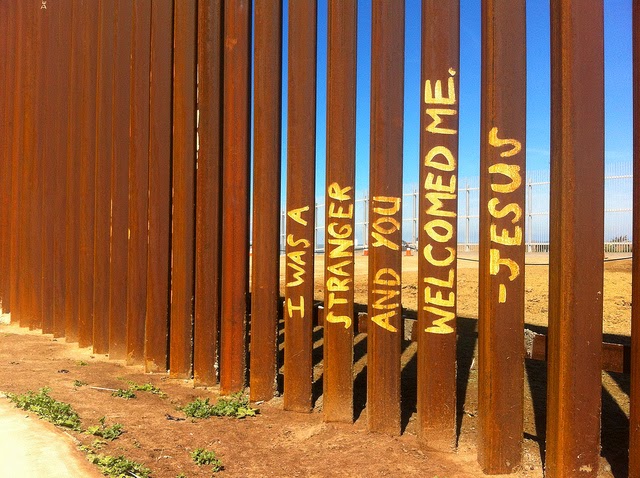I was sharing a
story recently about a 14-year-old boy I met who, a few months ago,
had taken the life-and-death risk along with his 13-year-old cousin
to travel from their home country of Honduras (in Central America) to
the United States. After bumpy bus rides to get to Mexico, hanging on
for life to the top of box cars on a fast moving freight train
journeying north, and finally swimming the Rio Grande they arrived on
the U.S. side of the border. But that was not the end of their
journey. After the river was the desert. They had no map, and they
had no food. Only water. They set out walking, and walking, and
walking. “We didn't know where we were going,” he said. “At
times we felt that perhaps we were going in circles. There was no
sign of civilization, of anything. I was hungry and tired. We had
walked three days without food. Only water. Finally,” he said, "I turned to my cousin and told her: 'I don't think I can go any
further. I think that I will die here.'”
Somehow,
miraculously, it was at that moment, when all hope seemed lost, that
the U.S. border patrol appeared. “When I saw them,” my friend
continued, “I gave thanks to God. I knew that if they returned me
to my country I would almost certainly face death there as well, but
at least there I would be buried by my family and not simply lost
here in the desert.”
In
keeping with what is reported in the US State Department's “Human
Rights Report “ on Honduras1,
this young boy spoke of the horrific situation in his own home
community. In recent years two of his uncles and several cousins
have been killed by criminal gangs. Staying – and refusing to join
the gangs – would have guaranteed his own death and possibly the
death of yet other family members. His cousin, like so many girls
they know, would have been forced into prostitution to support the
gangs or been forced to be the spouse or concubine of one of the gang
leaders. And so they fled – risking their lives in hope against
hope that somehow they might live!!
I shared this
story with someone who acknowledged that we hear of more and more
violence in our world. “Even here in the U.S.,” they said, “it
seems the news is filled with stories of violence. “Our world
is getting worse and worse,” they continued. “I think Jesus is
telling us: 'Get ready, because very soon I will be coming for my
own.'”
I was left speechless. This was their only response. They indicated no real human
pathos for the boy and his cousin or for other victims of violence.
Rather, for them the answer was simply that Jesus is coming to rescue
his own to heaven, and the rest be literally damned!
Now I
have to admit that if I believed this was the core Chrisitan
message, I would not be a Christian. But in fact, this understanding
flies in the face of the biblical message. According to the Bible,
heaven is not the answer. In both the Jewish and Christian scriptures
we learn that the message is not one of escape from the world but a calling to be engaged in the real lives of people in
the world, with a
particular care for those who are at the margins.
The Jewish Torah
(Exodus 22:20ff) is one place where we hear that God demands a
particular concern and care for the least powerful. “You shall not
molest (bully?) or oppress an alien (i.e. immigrant)” we read, “for
you were once immigrants yourselves in Egypt. You shall not wrong
any widow or orphan. If you ever wrong them and they cry out to me,
I shall surely hear their cry,” says the Lord. The passage
continues, that we should not charge interest to a poor person who
has borrowed money from us. Also, if you take the coat from a poor
person as security deposit, the coat must be returned by nightfall so
that they have something warm to sleep in. If we fail to abide by
these ethics and the person cries out to God, we are told, the God
will hear their cry and we, the ones who failed to hear their cry, will be the ones in trouble.
 Similarly, in the
Gospel of Matthew (25:36ff) we read that how we treat the hungry, the
thirsty, the naked, the stranger, the ill and those in prison – our
response to them is essentially our response to Jesus and to God.
Turning a blind eye, failing or refusing to recognize and respond
caringly to their need is essentially turing away from God.
Similarly, in the
Gospel of Matthew (25:36ff) we read that how we treat the hungry, the
thirsty, the naked, the stranger, the ill and those in prison – our
response to them is essentially our response to Jesus and to God.
Turning a blind eye, failing or refusing to recognize and respond
caringly to their need is essentially turing away from God.
Given the
conversation here in the United States about how we respond to those
like the young Honduran boy and girl whose story began this post, as
people of faith should not the words of these sacred text perhaps
give us pause? Are we not called to be a people who look at and live
life by values different from the values of our border-protecting,
us-against-them, it's-all-about-me consumerist society? I challenge myself and those
reading this post to consider how we might shape our lives and the
life of our societies and world today so as to embody – give flesh to - the
kind of values and calling offered by the writers of Exodus and
Matthew.
1 The
Executive Summary of the State Department's “Honduras 2013 Human
Rights Report” can be downloaded at
http://www.state.gov/documents/organization/220663.pdf




